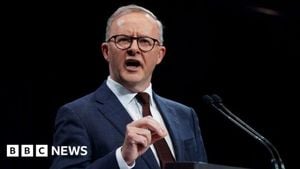Senator Tammy Baldwin of Wisconsin has managed to clinch re-election, marking her third consecutive term and delivering a significant win for the Democrats within this pivotal swing state. On election night, Baldwin faced off against Republican challenger Eric Hovde, who was backed by former President Donald Trump. Unofficial results show Baldwin winning by only 0.9%, or about 27,000 votes, which keeps the door open for Hovde to potentially call for a recount since the margin is less than 1%.
After the election was called, Baldwin expressed her gratitude, stating, “The voters have spoken and our campaign has won. The people of Wisconsin have chosen someone who always puts Wisconsin first, someone who shows up, listens, and works with everyone to get the job done.” Baldwin had initially declared victory earlier on Wednesday once absentee ballot counts from Milwaukee began tilting her way.
Following the announcement, Hovde refrained from conceding, indicating disappointment and questioning the integrity of the race. He cited the participation of Thomas Leager, a candidate from the America First Party whom he claimed was recruited by Democrat operatives to siphon votes away from him. Hovde remarked, “We’re watching the final precinct results come in,” and added, “It is what it is.”
Historically, Wisconsin has seen razor-thin margins during elections; Baldwin herself noted the close nature of the races, with this being the fifth time presidential elections have been decided by less than one point over the past seven cycles. Baldwin's victory not only marks her personal success but also serves as a buffer against the Republican efforts to dominate both Senate seats from Wisconsin.
Despite Democrats losing other key Senate races nationwide, Baldwin’s win is seen as a pivotal guardrail against Republican domination. Throughout her campaign, she emphasized her commitment to bipartisanship, focusing on collaboration over divisive politics, balancing her liberal voting record with outreach to more conservative voters. This strategy proved effective, as Baldwin gained support even from traditionally Republican demographics. Indeed, she became the first statewide Democratic candidate in over two decades to receive the endorsement from the Wisconsin Farm Bureau, demonstrating her appeal across party lines.
Hovde, on the other hand, leaned heavily on criticisms of Baldwin's record particularly surrounding issues of inflation, crime, and illegal immigration. Yet Baldwin's strategy of connecting with voters on various fronts allowed her to close the gap even in areas traditionally less favorable to Democrats. Her campaign reached out to urban, suburban, and rural communities alike, emphasizing her visibility and accessibility as key to securing votes.
Craig Gilbert, a political columnist, noted the rarity of such divided outcomes where one state votes for one presidential candidate but puts forth senators of opposing parties—a phenomenon Wisconsin has maintained for over 14 years, showcasing its polarized political climate. Nevertheless, even with the challenges posed by the top of the ticket losses, Baldwin's campaign managed to pivot the narrative to her favor, securing significant votes from rural counties where she traditionally outperformed her Democratic peers.
Hovde’s post-election commentary reflected on the possibility of pursuing action against the election results, stating, “It’s unfortunate if the Democrats wouldn’t have put up this plant, this probably would have been called some time ago.” This reference to the so-called ‘fraudulent candidate’ highlights the contentious aftermath of the elections.
Baldwin feels the weight of her role even more poignantly as she continues her advocacy for LGBTQ+ rights. With her re-election, she now stands as the only openly LGBTQ+ senator, especially significant as LGBTQ+ representation has seen notable declines following the exit of others like Kyrsten Sinema and Alphonza Butler. Her victory, as noted by LGBTQ+ advocates, serves as both validation and representation within the U.S. Senate.
After reflecting on her electoral success, Baldwin expressed hopes of cross-party collaboration to “fight for Wisconsin,” stating, “You know I will always fight for Wisconsin. And I also recognize many Wisconsinites chose Donald Trump, and I respect their choice.” This sentiment encapsulates her approach—intending to work on issues like healthcare alongside the new administration, always prioritizing her constituents’ concerns over partisanship.
Ironically, Baldwin's close race came at the very same moment many Democrats felt the sting of losses elsewhere. Even as Baldwin thanked the voters for their support, she acknowledged the broader political winds favoring Republicans nationally. But for now, Baldwin’s narrative remains centered on her commitment to Wisconsin’s future and her ability to deliver tangible results from Washington.
Going forward, Baldwin aims to leverage her experience and relationships to navigate the challenging political waters between her and the Republican majority. She emphasized the need for fostering environments of dialogue over divisiveness as America grapples with significant national issues. “We deserve politics with less vitriol, less division, and fewer lies. Actually, no lies,” Baldwin asserted, calling for integrity and cooperation as cornerstones of her continued service.
Through this tightly contested race, Baldwin has emerged not only as a survivor of vicious political battles but as one committed to fostering unity amid discord—a pledge she will carry with her as she steps back onto the Senate floor for another term.



